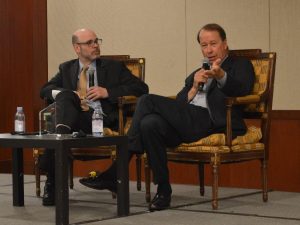
- Blackstone CEO “shuttling” between U.S., Chinese leaders to ease tensions
- James didn’t back Trump but credits him with positive economic policies
- Early start, gradual execution keys to successful leadership transition
Tony James, executive vice chairman of Blackstone Group, said Co-Founder and CEO Stephen Schwarzman is working to ease worsening tensions between the U.S. and Chinese governments over trade.
“He’s kind of shuttling back and forth, trying to make people stay calm and be reasonable,” James said of Schwarzman, who is close to top officials of both countries.
James made the comments on June 27 at Buyouts Insider’s PartnerConnect Midwest conference in Chicago.
The Chinese understand “there is a deal to be made here,” James said, with respect to the $375 billion U.S. trade deficit and losses of American jobs.
The benefits of such a deal could include lower tariffs and increased protection for intellectual property, but a successful resolution is far from certain: “This could get very dangerous, there’s a lot of miscommunication and misunderstanding,” he said.
China will not accept any U.S. measures that seem aimed at undermining its national prestige, James warned, raising the specter of possible conflict over Taiwan or other geopolitical flashpoints.
Though James characterized Donald Trump as impulsive and confrontational, he offered praise for the president’s performance as well: “I was not a Trump supporter, but you have to give him credit. Some of his policies and some of the changes he’s made have had a very positive effect on the economy.”
Infrastructure still needs to be addressed, James said, as the current state of national disrepair “saps a half percent a year from GDP growth.” (Blackstone is reportedly offering discounts to investors on its Saudi-backed infrastructure fund, targeting $40 billion.)
He also called for a higher minimum wage, saying that $7.25 an hour is “ridiculous” and that an increase would be in the interest of businesses, including those that would have to pay their workers more.
“America is a high-cost economy,” James explained. “We like being a high-cost economy; that’s what we want to be. That doesn’t mean we have to be inefficient. The antidote to that is innovation.”
He expressed alarm that “almost by every metric, China is starting to pass us in innovation.” The necessary response is “a long-term innovation policy” to ensure that the U.S. maintains its leadership position.
Citing “an explosion of technology coming out the labs,” he predicted that life sciences will be the source of “the next big technological revolution that affects all of our lives.”
James began by addressing the retirement-savings shortfall in the U.S., to which he has proposed a solution with economist Teresa Ghilarducci.
Their system would set aside 1.5 percent of workers’ pay, guaranteed by the government and matched by employers, into accounts to be pooled and managed like defined-benefit plans, such as pensions.
Whereas 401(k)s earn a 2.3 percent average return, “historically, pension plans have earned 7.56 percent over time,” James said. “The difference in compounding over a 40-year career is massive.”
At retirement, the accumulated wealth would be converted into a lifelong annuity, paid out by the Social Security Administration.
Asked whether this idea is self-serving, given that these new accounts would presumably be invested in alternative assets, James replied that he personally would not live to see any benefit, and Blackstone’s funds are oversubscribed in any case.
To the question of whether he harbors any political aspirations, James gave a terse response: “No.”
He was more forthcoming about Blackstone’s leadership transition, announced in February, when he handed over day-to-day management duties to Jon Gray, formerly the firm’s head of real estate.
Succession is “the Achilles heel” of any asset-management organization, James said, giving the example of Jack Welch’s selection of his successor as chief executive of GE. “In choosing Jeff Immelt, he lost the three other people who were at that level, so he hollowed out the senior executive ranks to choose the wrong person.”
By contrast, “I wanted to let the air out of the balloon slowly, both internally and externally, so that this would look completely natural.”
James said he groomed his chosen successor gradually, “showing him bits of the key decisions.” Eventually, “he shadowed me in everything.” But once there’s an heir apparent, “while you’re still in charge, there can be no doubts about who’s in charge, zero.”
The key is to start the process “before you need to”; by the time it’s necessary, “you’ve waited too long; that organization will continue to lose momentum.”
“You’ve got to do it before you’re ready, before you’ve lost a step,” James said, acknowledging that this is “not easy.”
Asked how Blackstone achieved such success during his tenure, James singled out the firm’s culture, including a commitment to “robust debate”: “No one is defensive. It’s not a personal attack, but you can certainly attack someone’s thesis.”
While Blackstone has embraced scale for the advantages it brings, “at the same time I want to be more humble and have a more personal feel than firms a tenth our size.”
James also emphasized the importance of excelling in selected areas, rather than pursuing numerous strategies without competitive advantage.
Conscious of Blackstone’s association with “old economy” sectors, James said the firm is “maniacally focused” on disruptive technology:
“We’re the only private equity firm in the world that has its own captive big-data group, applying big data not only to our investment decisions, but taking that and asking our portfolio companies to use it. That is the future of Blackstone.”


 If you do not receive this within five minutes, please try and sign in again. If the problem persists, please
email:
If you do not receive this within five minutes, please try and sign in again. If the problem persists, please
email: